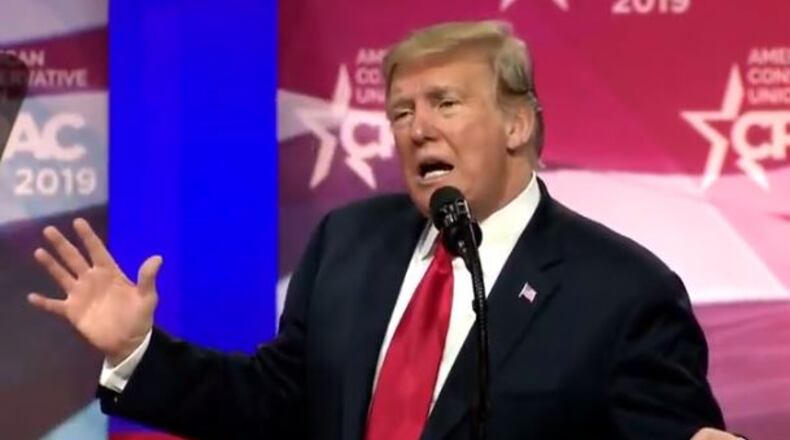The Russian legislative blitz comes as Democrats on a series of House committees have stepped up their requests for information from the White House and the Trump Administration on issues related to the Russia investigation and the Mueller probe.
So far, Democrats say they aren't getting much in the way of help from the White House on any of their investigative efforts.
"It's like, zero," said House Oversight Committee Chairman Rep. Elijah Cummings (D-MD). "We can't get witnesses, they don't want us to talk to witnesses."
Among the Russia-related bills on the schedule this week in the House:
+ The "KREMLIN Act," a bipartisan bill which would require the Director of National Intelligence - already reportedly in hot water with the President for saying that North Korea probably wouldn't give up its nuclear arsenal - to submit to Congress a new round of intelligence assessments on Russia and its leaders. "The Kremlin's efforts to sabotage our democracy and those of our allies across Europe are undeniable," said Rep. Raja Krishnamoorthi (D-IL), who has sponsored this bill with fellow Intelligence Committee member Rep. Chris Stewart (R-UT).
Earlier this year, DNI Dan Coats said of Russia: "We assess that Moscow will continue pursuing a range of objectives to expand its reach, including undermining the US-led liberal international order, dividing Western political and security institutions, demonstrating Russia’s ability to shape global issues, and bolstering Putin’s domestic legitimacy."
+ The Vladimir Putin Transparency Act, a bipartisan bill which again asks the U.S. Intelligence Community to weigh in with evidence about the Russian government, and expressing the sense of Congress 'that the United States should do more to expose the corruption of Vladimir Putin.'
"I am proud to cosponsor this bill which aims to identify Putin and his allies for who they are: nefarious political actors undermining democracies," said Rep. Elise Stefanik (R-NY), who teamed up with Rep. Val Demings (D-FL) on this measure.
"Some people HATE the fact that I got along well with President Putin of Russia," President Trump tweeted last July, after his controversial summit with Putin in Finland. "They would rather go to war than see this. It’s called Trump Derangement Syndrome!"
+ A bipartisan bill to block any move by the U.S. Government to recognize the 2014 annexation of Crimea by Russia and Vladimir Putin. This is another measure meant to put public pressure on the President, who has been somewhat uneven in public statements on his feelings about Russia's move to take Crimea, as well as the ongoing proxy war being supported by Moscow in areas of eastern Ukraine, and how the U.S. should respond - even as his administration has leveled new economic sanctions against Moscow.
In November of 2018, the President canceled a scheduled meeting with Putin at the G20 Summit in Argentina, after Russian naval forces seized several Ukrainian ships and their crews.
+ A bipartisan resolution calling for 'accountability and justice' surrounding the assassination of Russian activist Boris Nemtsov, who was shot and killed in Moscow in 2015. Lawmakers in both parties have urged the Trump Administration to sanction those involved in the murder, as the measure also calls for an international investigation into his death. "Boris Nemtsov had a vision for a democratic and free Russia. Sadly, that put him right in Putin's cross hairs," said Rep. Eliot Engel (D-NY). This not just a House effort, as there is a companion bill in the Senate sponsored by Sen. Marco Rubio (R-FL).
"Putin's media and surrogates called Boris Nemtsov an 'enemy of the people,'" said Michael McFaul, the U.S. Ambassador to Russia under President Obama, and a frequent critic of President Trump.
+ Special Counsel Robert Mueller's report. While the four previous legislative measures have bipartisan support, the final piece of this "Russia" week in the U.S. House might create a bit of a tussle on the floor of the House, as Democrats move to put GOP lawmakers on the record about whether they want to make any report from the Special Counsel public.
Under the Special Counsel law, there is no guarantee that the Mueller report will ever see the light of day - the Special Counsel submits a report to the U.S. Attorney General - in this case, William Barr - who is then authorized to summarize that to Congress.
That's different than back during the Monica Lewinsky scandal, when independent counsel Ken Starr was able to send Congress volumes and volumes of evidence - knowing that all of it would be made public.
In testimony before the Senate earlier this year, Barr did not expressly commit to releasing any report, saying "my goal will be to provide as much transparency as I can consistent with the law. I can assure you that, where judgments are to be made by me, I will make those judgments based solely on the law and will let no personal, political, or other improper interests influence my decision."
About the Author





